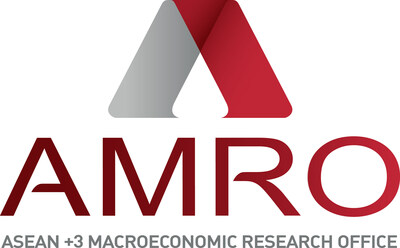SINGAPORE, Oct. 10, 2024 /PRNewswire/ -- The ASEAN+3 Macroeconomic Research Office (AMRO) today launched its ASEAN+3 Financial Stability Report (AFSR 2024), which analyzes the latest market developments and potential risks within the ASEAN+3 region, while offering comprehensive analyses on some key challenges confronting the region. Since December 2023, financial risks in the ASEAN+3 region have evolved: while some risks (high inflation, higher for longer interest rate) have subsided, others (geopolitical tensions) have intensified. The region is poised to face a wide range of risks and challenges to financial stability in the near- to long-term.

The first half of 2024 experienced an easing in global financial conditions as the US Federal Reserve (Fed) concluded its policy rate hiking cycle. Market movements were primarily influenced by expectations around the Fed's actions. However, in the third quarter of 2024, uncertainties about the US growth outlook, compounded by the unwinding of yen carry trades, sparked notable market volatility. The Fed commenced its monetary easing in September, which has led to an easing of monetary conditions, but uncertainties around inflation and growth outlook linger. Moreover, the geopolitical situation in the Middle East remains fragile and the result of the upcoming US presidential election remains a major source of uncertainties for financial markets.
"Overall, the risk to financial stability across ASEAN+3 in 2024 appears lower than in 2023. The current climate of robust growth and disinflation presents regional policymakers an opportunity to reduce debt, rebuild policy space, and strengthen fiscal capacity to better manage potential shocks. Replenishing foreign exchange reserves during times of capital inflows can further enhance market confidence and provide a buffer against extreme market volatility," said AMRO Chief Economist Hoe Ee Khor.
The thematic studies in AFSR 2024 provide an in-depth analysis of the specific risks confronting the region. ASEAN+3 remains vulnerable to macro-financial shocks from major advanced economies and other external factors, while the growing interconnectivity of ASEAN+3 financial systems underscores the need to take a holistic macroeconomic and financial view of the region to safeguard against systemic risks.
The real estate market downturn triggered by the COVID-19 pandemic and high inflation has raised additional concerns, as weakened demand and tighter financial conditions in several economies have severely impacted the financial health of property developers, leading to declining profitability, liquidity, and debt servicing capacity. Robust capital buffers in the banking sector appear to have mitigated spillover risks from the property market, but less visible threats from smaller local banks and shadow banking activities related to the property sector lurk, requiring close monitoring and may necessitate regulatory intervention.
The region's heavy reliance on the US dollar for cross-border financial activities poses two major risks: 1) a potential shortage of US dollar funding, which could destabilize financial markets and intermediaries; and 2) the transmission of global shocks through the US dollar, particularly during periods of monetary tightening or geopolitical tension.
Policy recommendations
In the near term, ASEAN+3 economies should remain vigilant against the risks of a resurgence of inflation, escalating geopolitical tensions, and a global growth slowdown. Continuous monitoring of international spillovers is crucial, alongside enhancing regional macroeconomic and financial surveillance and cooperation. Critical measures include strengthening cross-border surveillance and data sharing, conducting regional stress testing, enhancing home-host supervision, and strengthening the regional financial safety net.
Measures to stabilize the property sector should be implemented to prevent fundamentally sound companies from defaulting due to tight credit conditions driven by a worsening market, while enhancing the soundness of financial institutions with significant exposure, especially smaller banks and nonbank financial intermediaries (NBFIs).
To strengthen resilience against external shocks in a dollar-dependent environment, ASEAN+3 economies should reinforce their economic and financial fundamentals, enhance surveillance frameworks for monitoring US dollar liquidity, fortify macroprudential measures for banks and NBFIs, and provide financing support to member economies experiencing US dollar liquidity stresses. Furthermore, reducing structural reliance on the US dollar in the medium- to long-term by promoting the use of local currencies and developing cross-currency payment systems should be a key priority.
"To tackle the near- to long-term risks and challenges to ASEAN+3's financial stability, the region must come together as one and strive for resilience and stability," emphasized Dr. Khor.
More details can be found in AMRO's latest flagship report, the ASEAN+3 Financial Stability Report 2024.
About AMRO
The ASEAN+3 Macroeconomic Research Office (AMRO) is an international organization established to contribute toward securing macroeconomic and financial resilience and stability of the ASEAN+3 region, comprising 10 members of the Association of Southeast Asian Nations (ASEAN) and China; Hong Kong, China; Japan; and Korea. AMRO's mandate is to conduct macroeconomic surveillance, support regional financial arrangements, and provide technical assistance to the members. In addition, AMRO also serves as a regional knowledge hub and provides support to ASEAN+3 financial cooperation.
Logo - https://mma.prnewswire.com/media/2048913/AMRO_ColorRGB_FA_Logo.jpg
![]() View original content:https://www.prnewswire.co.uk/news-releases/disinflation-amid-robust-growth-presents-opportunity-to-rebuild-policy-space-in-asean3-302272698.html
View original content:https://www.prnewswire.co.uk/news-releases/disinflation-amid-robust-growth-presents-opportunity-to-rebuild-policy-space-in-asean3-302272698.html

